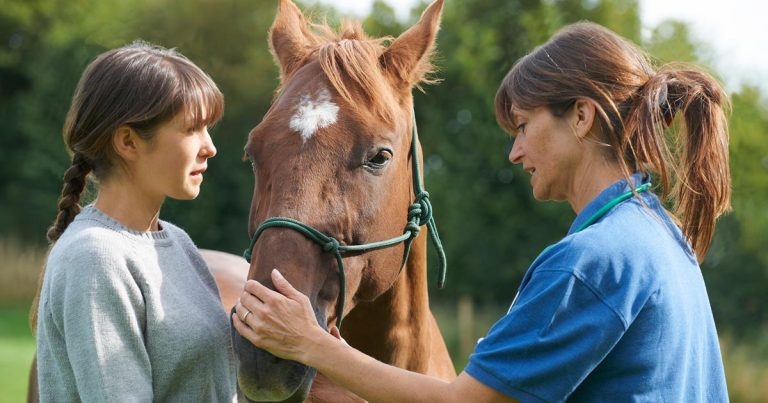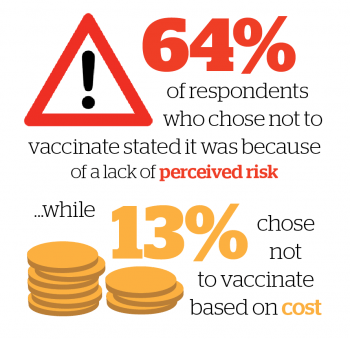2 Jul 2018
Equine vets would do well to dust off their assertiveness skills and engage with owners, after a survey for Keeping Britain’s Horses Healthy found the majority craved much more advice.

Image © highwaystarz / Adobe Stock
More than three-quarters (76%) of horse owners want to know more about preventive health care from their vet at visits, according to a survey carried out as part of the Keeping Britain’s Horses Healthy (KBHH) campaign.
Other main sources of information for horse owners were printed materials, websites, social media and friends, but owners expressed a wish to be educated by vets who were happy to listen and expressed a genuine interest in their horse.
Fieke Bennett, equine business manager at MSD Animal Health, which coordinates KBHH, said: “Our survey results should give equine vets confidence owners want to be educated by them, and by taking the time to do this they are increasing the value of their visit for both their clients and themselves.
“Quite rightly, equine vets are perceived to be the specialists, so showing an interest in the specific needs of a horse allows the vets to understand any gaps in knowledge or confidence the owner may have about his or her horse’s care.”
MSD said further details from the survey, involving 1,650 respondents in an online survey by Horse and Hound last August, appeared to shed light on why some owners did not follow preventive health care protocols.
Of those owners who chose not to vaccinate their horse, 64% said it was because of a lack of perceived risk. Statements in the survey – such as “my horse doesn’t come into contact with other horses”, “there’s no disease in my area” and “my horse doesn’t leave the property” – revealed a lack of understanding of the risk of disease by horse owners, according to MSD. Only 13% chose not to vaccinate based on cost.
Mrs Bennett said: “Many equine vets are nervous about making preventive health care recommendations, because they believe the owner to perceive the costs as high. Our survey suggests there are many other reasons why horse owners don’t proactively engage with preventive health care.
“51% of owners who don’t vaccinate their horses would change their mind if they understood the risk of disease better. Equine vets, therefore, have a vital role to play in educating horse owners, and improving the levels of vaccination in the UK and the health of our horses.”
 The survey also revealed an opportunity for equine vets in routine dentistry. Only 36% of survey respondents claimed to have their horses’ teeth checked at least annually by a vet, while 51% used an equine dental technician to do the checks. According to MSD, this presents equine vets an opportunity to do dental checks as part of a wider health check during vaccination.
The survey also revealed an opportunity for equine vets in routine dentistry. Only 36% of survey respondents claimed to have their horses’ teeth checked at least annually by a vet, while 51% used an equine dental technician to do the checks. According to MSD, this presents equine vets an opportunity to do dental checks as part of a wider health check during vaccination.
Mrs Bennett said: “There is an appreciation of the value of equine dentistry, yet some equine vets are missing out on providing this service. Every visit is an opportunity to discuss all aspects of health and wellness to increase the value of the visit for the patient, the client and the vet.”
Parasite control was another area covered by the survey, which showed 37% of owners followed a yard protocol to decide how to worm their horse, but only 24% sought their vet’s advice on parasite control.
Summing up, Mrs Bennett said: “The vaccination visit has traditionally been relatively brief and can vary considerably in format between veterinary surgeons. We live, however, in an age where horse owners are exposed to lots of information from various sources, but they highly value information and advice from the specialists.
“Equine vets, therefore, have an opportunity to drive health care discussions and proactively provide advice in conjunction with a full clinical examination. This has the potential to add value to the visit, for both the owner and the vet, and ultimately provide better health care for our horses.
“Horse owners want to know more about preventive health care from their vet and 50% of our respondents think vets should spend more time on routine health care for their horses. The opportunity is there for vets to lead the way.”
KBHH was launched in 2014 by MSD in partnership with a number of supporters, including Veterinary Times, to help educate horse owners on issues including vaccination, infectious disease and herd immunity. It put the vet as pivotal in delivering preventive health care, launched the annual Horse Health Week and has provided a range of materials for vets to help them engage with horse owners.
For more information, visit MSD’s website.